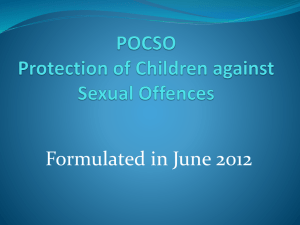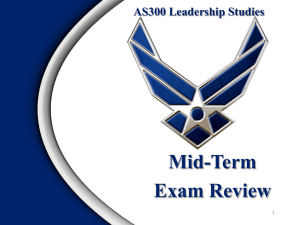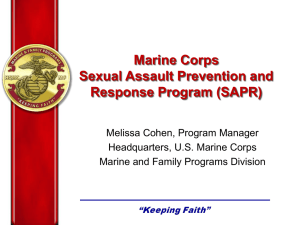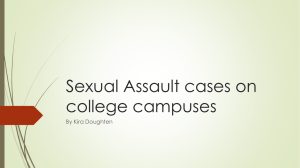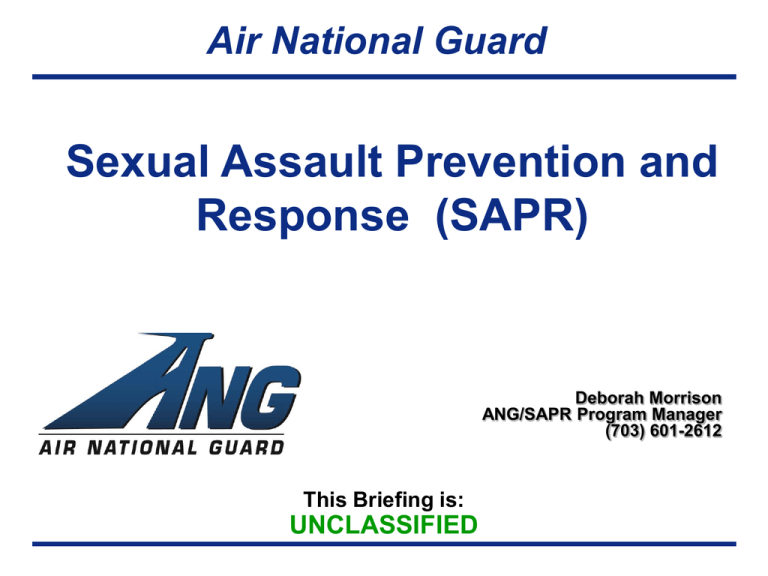
Air National Guard
Sexual Assault Prevention and
Response (SAPR)
Deborah Morrison
ANG/SAPR Program Manager
(703) 601-2612
This Briefing is:
UNCLASSIFIED
Objective
• To brief annual sexual assault prevention and response
training in the AOR
Overview
• Prevention
• SAPR program
• Definition of Sexual Assault
• The Deployed Environment
• SARCs in the AOR
• The Victim Advocacy Program
• Safety Issues
• Response
• Restricted/Unrestricted reporting
• Post Sexual Assault
• Deployed SARC Information
• Points of Contact
Program Background
Policy
DoD Policy Changes:
• DoD Directive (DoDD 6495.01) (Oct 05)
• DoD Instruction (DoDI – 6495.02 - SAPR Program Procedures signed June
23, 2006)
• DAF Policy Changes:
• AFI presently in coordination
• Will replace DAF Policy on Sexual Assault and Prevention, 03 Jun 2005
Why A SAPR Program?
• Sexual Assault Reporting in the Military
• Privacy concerns (crucial to reporting)
• Total Incidence and Prevalence is Unknown – only know what is
reported
• Reporting is necessary to reduce sexual assault
• Restricted reporting will allow victims more privacy
• Unrestricted allows for Prosecution/Removal of Offenders
• Training
• Educates victims on their options
• Educates AF members on problem and how they can help
Definition
Sexual assault is a crime.
Sexual assault is defined as intentional sexual contact,
characterized by use of force, physical threat or abuse of authority
or when the victim does not or cannot consent. Sexual assault
includes rape, nonconsensual sodomy (oral or anal sex), indecent
assault (unwanted, inappropriate sexual contact or fondling), or
attempts to commit these acts. Sexual assault can occur without
regard to gender or spousal relationship or age of victim.
“Consent” shall not be deemed or construed to mean the failure by
the victim to offer physical resistance. Consent is not given when a
person uses force, threat of force, coercion or when the victim is
asleep, incapacitated, or unconscious.
Why are Sexual Assaults Crimes ?
• Sexual Assault is the general term for
• Acts of intentional sexual contact
• characterized by use of force
• Threats and intimidation or abuse of authority
• The victim does not or cannot consent.
• It harms the individual and society and has
been made a crime by state legislatures and
Congress.
What is Consent?
• Words or overt acts indicating a freely given
agreement to the sexual conduct at issue by a
competent person
• When there is not consent
• Expressing through words or conduct there is
no consent
• Failing to express consent through use of
force, threat of force, or placing another
person in fear
• There is/has been a current or previous dating
relationship
• The way the person is dressed
Who do I Report to?
• AF Sexual Assault Response Coordinator (SARC)
•
•
Main point of contact for reporting, response and victim advocacy at installation
level and deployed area (CENTAF SARC)
SARC reports directly to the Vice Wing Commander
• Victim Advocate (VA)
•
•
•
•
•
Assigned by SARC
From different Organizations
Male or Female
Assists the Victim throughout process
• Referrals
• Information
• Appointments
Help as long as needed
Who do I Report to?
• Chaplains
• Privileged communication that does not allow for entitlement of restricted
reporting
• Chaplains will not breech covered communications. If the reporter would like
a restricted/unrestricted case, they must speak with the SARC
• Health Care Providers (HCP)
• HCPs will not breech confidentiality with patients
• HCPs will report an incident has occurred to the SARC
• If the victim would like a restricted or an unrestricted case, they must speak
with the SARC
SAPR Office
and
WHAT WE DO
•
•
•
•
Sexual Assault Prevention
Training and Education to
Institutionalize Core Values
Advertising Campaigns
Community Involvement
Sexual Assault Awareness
Month (April)
•
•
•
•
•
Sexual Assault Response
24 / 7 Response Coverage
Victims to “Survivors”
Local Support Networks
Trained Victim Advocates
Monthly Case Management
Preparing to Deploy
• Expect a brief that is Service specific to deployed
Service members outside the United States
• Expect to hear about sexual assault prevention,
offender accountability, and victim care in the
deployed environment
• Expect to become familiar with the ROEs and risk
reduction factors tailored to specific deployment
location(s)
• Expect a brief history of the specific foreign countries
for deployment
Preparing to Deploy
• Expect a brief that discusses the area’s customs, mores,
and religious practices
• Coalition partners in the deployed location
• Become familiar with the ROEs for reporting sexual
assault in the deployed area
• Talk with your Wingman and ensure other Service
members are aware of options available at the deployed
location
• Ask about available trained sexual assault first
responders
SARCs in the Deployed
Environment
• Deployed SARCs are military or civilians on orders in
the AOR
• Each service has a responsibility for certain
geographic locations
• Joint Forces coordinate services for victims
In the Deployed Environment, SARCs:
• Ensure continuity for any Service member reporting
an assault
• Ensure all reports are provided to the chain of
command and the appropriate MAJCOM SARC
• Provide Victim Advocate training in the AOR when
needed
Volunteer Victim Advocates
(VA)
• Air Force Victim Advocates provide essential support,
liaison services and care to the victim
• Responsibilities include providing crisis intervention,
referral and ongoing non-clinical support, including
information on available options and resources to assist
the victim in making informed decisions about the case
• VA services will continue until the victim states support is
no longer needed
Safety in the Deployed
Environment
• In the AOR, follow command directives
• Follow ROEs for particular deployed area
• Stay within compound
• Don’t go anywhere alone
• Have a “buddy” system
• Use your Wingman
• If assaulted, consider immediately reporting
• Seek medical attention and advocacy
Prevention
Bystander Intervention
• Bystanders—someone in the group who is watching the
situation between two Airmen and is aware the incident
may escalate without intervention
• Bystanders may hesitate to become directly involved in a
situation as it makes them feel uncomfortable
• There is tremendous fear of negative social consequences that may
come with being the challenger
• It takes courage to make a difference in someone’s life
and challenge negative behavior
• In our Guard community it will take a courageous stand
by individuals to change the climate around sexual
assault
• This is part of every Airmen’s core values
Bystander Intervention
• It is crucial to remember the responsibility is always to
the greater Guard community and not to one individual
who may be assisting, or paving the way to an assault
• It takes one voice to make the difference—for every
person who is the challenger, there are a lot more people
who appreciate that the behavior has been shut down
• Bystanders can take certain steps to intervene
•
•
•
•
Consider safety
Decide to use direct or indirect action to resolve the problem
What options are there?
What actions can be taken?
Risk Reduction
Avoid the use
of alcohol
and drugs
Rely on your
instincts
and be watchful
Establish and
maintain your
limits
Risk Factors
Current sexual assault trend data shows that:
• The majority of military victims are 20-24 year-old females in the
enlisted ranks
• Most military alleged perpetrators are 20-24 year-old males
• Most military sexual assaults occur in the dormitories and living
areas
• More than half of sexual assault cases involve alcohol use
• 86% of reported cases
Source: Task Force Report on Sexual Assault Policies, dated 27 May 2004
Sexual Assault Prevention and Response
Airmen Should Be:
• Alert
• Safe
• Assertive
• Prepared
NOTE:
Most sexual assault victims know
and/or trust their offenders before
the assault
REMEMBER NO MEANS NO!
You should:
• Use the buddy system – look out for each other and use your
Wingman
• Report inappropriate behavior immediately
• Practice the AF Values—Integrity first, Service before self, and
Excellence in all we do
• Never leave a fallen comrade
Response
Restricted vs. Unrestricted
Reporting
Restricted Reporting
• Restricted reporting is confidential
• Will not trigger an investigation
• Who may make a restricted report
• Active duty military personnel of the Armed Forces
• Members of Reserve or members of the National Guard in Federal
service (Title 10 status)
• AT, IDT, or AGR state status, ADSW for over 30 days
• Must be military
• Criteria for restricted reporting. Victim must first report
to one of these individuals
• SARC or VA
• Chaplain
• In the deployed environment, a healthcare provider (HCP)
Unrestricted Reporting
• Report made to SARC, VA, or healthcare provider when
the individual does not elect restricted reporting
• Sexual assault reported through normal channels
• Chain of command
• Law enforcement
• AFOSI
Restricted Reporting
• Advantages to Restricted Reporting
•
•
•
•
Privacy protected
Chain of Command is NOT notified
Medical care, counseling and victim advocacy services offered
Collateral misconduct may not be discovered
• Disadvantages to Restricted Reporting
• No investigation
• Perpetrator will not be prosecuted
Unrestricted Reporting
• Advantages of Unrestricted Reporting
•
•
•
•
Assistance from law enforcement including investigation
Assistance from command
Perpetrator may be caught and prosecuted
Medical care, counseling and victim advocacy services are provided
• Disadvantages of Unrestricted Reporting
• Lack of privacy
• May be punished for collateral misconduct
• Victims cannot change to restricted reporting
Post Sexual Assault
Immediately following a sexual assault--get help
Be careful not to destroy evidence
• DO call the SARC immediately
• DO seek medical attention if necessary
• DO consider reporting the assault using the unrestricted
option, if injured or in danger
• DON’T shower, change clothes, clean room/assault site
• DON’T brush teeth, eat or drink
• DON’T urinate
Deployed SARC Contact
Information
•
•
•
•
•
•
•
•
•
•
•
332 AEW
376 AEW
380 AEW
380 AEW
386 AEW
455 AEW
407 AEG
447 AEG
506 AEG
451 AEG
449 AEG
• 64 AEG
Balad
Manas, Kyrgystan
Al Udeid, Qatar
Al Dhafra, UAE
Ali Al Salem, Kuwait
Bagram, Afghanistan
Ali, Iraq
BIAP, Iraq
Kirkuk, Iraq
Kandahar, Afghanistan
CJTF-HOA, Africa
Riyadh, Saudi Arabia
318-443-7272
318-476-0602
318-437-7500
318-434-7272
318-442-2394
318-231-2245
318-445-2716
318-446-3009
318-460-0122
318-463-1205
318-318-824-4322;
318 439-9026
318-252-8910
Point of Contact Information
COL Jane Helton, Chief, Sexual Assault Prevention and
Response Division, (703) 607-1460
Jane Lux, Program Coordinator, Sexual Assault Prevention
and Response, (703)601-0577
MAJ Laura Wade, Program Manager, Army National Guard,
National Guard Bureau, (703) 607-2211
Deborah Morrison, Program Manager, Air National Guard,
National Guard Bureau, (703) 601-2612
Questions

